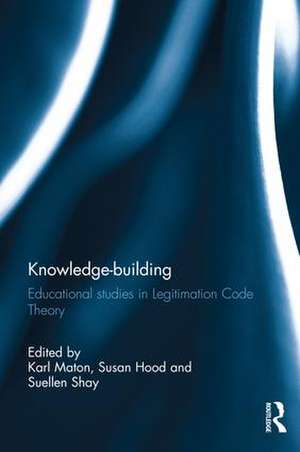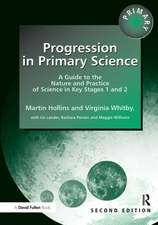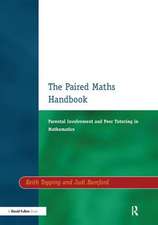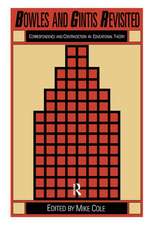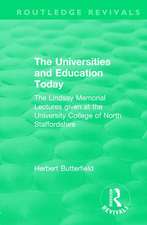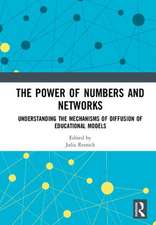Knowledge-building: Educational studies in Legitimation Code Theory: Legitimation Code Theory
Editat de Karl Maton, Susan Hood, Suellen Shayen Limba Engleză Paperback – 16 mai 2017
Through case studies of major research projects, Part I provides practical insights into how LCT can be used to build knowledge by:
- enabling dialogue between theory and data in qualitative research
- bringing together quantitative and qualitative methodologies in mixed-methods research
- relating theory and practice in praxis
- conducting interdisciplinary studies with systemic functional linguistics
Part II offers a series of studies of pressing issues facing knowledge-building in education and beyond, encompassing:
- diverse subject areas, including physics, English, cultural studies, music, and design
- educational sites: schooling, vocational education, and higher education
- practices of research, curriculum, pedagogy and assessment
- both education and informal learning contexts, such as museums and masonic lodges
Carefully sequenced and interrelated, these chapters form a coherent collection that gives a unique insight into one of the most thought-provoking and innovative ways of building knowledge about knowledge-building in education and society to have emerged this century. This book is essential reading for all serious students and scholars of education, sociology and linguistics.
| Toate formatele și edițiile | Preț | Express |
|---|---|---|
| Paperback (1) | 455.78 lei 6-8 săpt. | |
| Taylor & Francis – 16 mai 2017 | 455.78 lei 6-8 săpt. | |
| Hardback (1) | 1222.36 lei 6-8 săpt. | |
| Taylor & Francis – 19 oct 2015 | 1222.36 lei 6-8 săpt. |
Preț: 455.78 lei
Nou
Puncte Express: 684
Preț estimativ în valută:
87.24€ • 94.80$ • 73.33£
87.24€ • 94.80$ • 73.33£
Carte tipărită la comandă
Livrare economică 21 aprilie-05 mai
Preluare comenzi: 021 569.72.76
Specificații
ISBN-13: 9781138103795
ISBN-10: 1138103799
Pagini: 282
Ilustrații: 11 Tables, black and white; 26 Illustrations, black and white
Dimensiuni: 156 x 234 x 15 mm
Greutate: 0.45 kg
Ediția:1
Editura: Taylor & Francis
Colecția Routledge
Seria Legitimation Code Theory
Locul publicării:Oxford, United Kingdom
ISBN-10: 1138103799
Pagini: 282
Ilustrații: 11 Tables, black and white; 26 Illustrations, black and white
Dimensiuni: 156 x 234 x 15 mm
Greutate: 0.45 kg
Ediția:1
Editura: Taylor & Francis
Colecția Routledge
Seria Legitimation Code Theory
Locul publicării:Oxford, United Kingdom
Public țintă
PostgraduateCuprins
List of illustrations
List of contributors Acknowledgements
Chapter 1 Legitimation Code Theory: Building knowledge about knowledge-building
Karl Maton
PART I - A PRACTICAL THEORY: PUTTING LCT TO WORK
Chapter 2 LCT in Qualitative Research: Creating a translation device for studying constructivist pedagogy
Karl Maton and Rainbow Tsai-Hung Chen
Chapter 3 LCT in Mixed-Methods Research: Evolving an instrument for quantitative data
Karl Maton and Sarah K. Howard
Chapter 4 LCT in Praxis: Creating an e-learning environment for informal learning of principled knowledge
Karl Maton, Lucila Carvalho and Andy Dong
Chapter 5 LCT and Systemic Functional Linguistics: Enacting complementary theories for explanatory power
Karl Maton, J.R. Martin and Erika Matruglio
PART II - KNOWLEDGE-BUILDING IN EDUCATION AND BEYOND: STUDIES USING LCT
Chapter 6 Ethnographies on the move, stories on the rise: Methods in the humanities
Susan Hood
Chapter 7 Enabling knowledge progression in vocational curricula: Design as a case study
Suellen Shay and Diane Steyn
Chapter 8 Secondary school English literary studies: Cultivating a knower code
Frances Christie
Chapter 9 Putting physics knowledge in the hot seat: The semantics of student understandings of thermodynamics
Helen Georgiou
Chapter 10 Musicality and musicianship: Specialization in jazz studies
Jodie L. Martin
Chapter 11 Knowledge and knowers in tacit pedagogic contexts: Freemasonry in France
Célia Poulet
PART III - RESOURCES FOR KNOWLEDGE-BUILDING
Chapter 12 Starting points: Resources and architectural glossary
Karl Maton
References
Index
List of contributors Acknowledgements
Chapter 1 Legitimation Code Theory: Building knowledge about knowledge-building
Karl Maton
PART I - A PRACTICAL THEORY: PUTTING LCT TO WORK
Chapter 2 LCT in Qualitative Research: Creating a translation device for studying constructivist pedagogy
Karl Maton and Rainbow Tsai-Hung Chen
Chapter 3 LCT in Mixed-Methods Research: Evolving an instrument for quantitative data
Karl Maton and Sarah K. Howard
Chapter 4 LCT in Praxis: Creating an e-learning environment for informal learning of principled knowledge
Karl Maton, Lucila Carvalho and Andy Dong
Chapter 5 LCT and Systemic Functional Linguistics: Enacting complementary theories for explanatory power
Karl Maton, J.R. Martin and Erika Matruglio
PART II - KNOWLEDGE-BUILDING IN EDUCATION AND BEYOND: STUDIES USING LCT
Chapter 6 Ethnographies on the move, stories on the rise: Methods in the humanities
Susan Hood
Chapter 7 Enabling knowledge progression in vocational curricula: Design as a case study
Suellen Shay and Diane Steyn
Chapter 8 Secondary school English literary studies: Cultivating a knower code
Frances Christie
Chapter 9 Putting physics knowledge in the hot seat: The semantics of student understandings of thermodynamics
Helen Georgiou
Chapter 10 Musicality and musicianship: Specialization in jazz studies
Jodie L. Martin
Chapter 11 Knowledge and knowers in tacit pedagogic contexts: Freemasonry in France
Célia Poulet
PART III - RESOURCES FOR KNOWLEDGE-BUILDING
Chapter 12 Starting points: Resources and architectural glossary
Karl Maton
References
Index
Notă biografică
Karl Maton is Professor of Sociology and Founding Director of the LCT Centre for Knowledge-Building at the University of Sydney, Australia, and Visiting Professor at Rhodes University, South Africa.
Susan Hood is Associate Professor at the University of Technology, Sydney, Australia.
Suellen Shay is Associate Professor at the University of Cape Town, South Africa.
Susan Hood is Associate Professor at the University of Technology, Sydney, Australia.
Suellen Shay is Associate Professor at the University of Cape Town, South Africa.
Recenzii
"...a generous, challenging and generative contribution to research into education and society that provides invaluable insights, ideas and tools for enactment… the book offers useful tools for change to both researchers and educational practitioners alike … Even if readers of this volume are new to LCT research and theory, they will be able to make sense of the theory and how it has been enacted in the studies"
Sherran Clarence, Rhodes University, South Africa
"The book offers insight into an astonishing way of analyzing and building knowledge about knowledge and its practices in different contexts … one of the most promising theoretical framework for analyzing knowledge practices … a great example of using the theory in research. … It is also a great introduction to research design using LCT, which overcomes the dichotomy between theory and practice."
Marcin Boryczo, University of Gdansk, Poland
"[T]he book's scope and contents make it a valuable resource for English teachers and researchers. It is an excellent primer… for either action research or academic research projects. The value of Knowledge-Building is that is demonstrates many of the research tools that are needed to discover the answers … [to] questions which need to be addressed if we are to better enable English language learners to be academically successful and to integrate more successfully into English speaking cultures"
Richard Ingold, Navitas English, Sydney, Australia
Sherran Clarence, Rhodes University, South Africa
"The book offers insight into an astonishing way of analyzing and building knowledge about knowledge and its practices in different contexts … one of the most promising theoretical framework for analyzing knowledge practices … a great example of using the theory in research. … It is also a great introduction to research design using LCT, which overcomes the dichotomy between theory and practice."
Marcin Boryczo, University of Gdansk, Poland
"[T]he book's scope and contents make it a valuable resource for English teachers and researchers. It is an excellent primer… for either action research or academic research projects. The value of Knowledge-Building is that is demonstrates many of the research tools that are needed to discover the answers … [to] questions which need to be addressed if we are to better enable English language learners to be academically successful and to integrate more successfully into English speaking cultures"
Richard Ingold, Navitas English, Sydney, Australia
Descriere
Education and knowledge have never been more important to society, yet research is segmented by approach, methodology or topic. Legitimation Code Theory or ‘LCT’ extends and integrates insights from Pierre Bourdieu and Basil Bernstein to offer a framework for research and practice that overcomes segmentalism. This book shows how LCT can be used to build knowledge about education and society. Comprising original papers by an international and multidisciplinary group of scholars, Knowledge-building offers the first primer in this fast-growing approach.
Through case studies of major research projects, Part I provides practical insights into how LCT can be used to build knowledge by:
- enabling dialogue between theory and data in qualitative research
- bringing together quantitative and qualitative methodologies in mixed-methods research
- relating theory and practice in praxis
- conducting interdisciplinary studies with systemic functional linguistics
Part II offers a series of studies of pressing issues facing knowledge-building in education and beyond, encompassing:
- diverse subject areas, including physics, English, cultural studies, music, and design
- educational sites: schooling, vocational education, and higher education
- practices of research, curriculum, pedagogy and assessment
- both education and informal learning contexts, such as museums and masonic lodges
Carefully sequenced and interrelated, these chapters form a coherent collection that gives a unique insight into one of the most thought-provoking and innovative ways of building knowledge about knowledge-building in education and society to have emerged this century. This book is essential reading for all serious students and scholars of education, sociology and linguistics.
Through case studies of major research projects, Part I provides practical insights into how LCT can be used to build knowledge by:
- enabling dialogue between theory and data in qualitative research
- bringing together quantitative and qualitative methodologies in mixed-methods research
- relating theory and practice in praxis
- conducting interdisciplinary studies with systemic functional linguistics
Part II offers a series of studies of pressing issues facing knowledge-building in education and beyond, encompassing:
- diverse subject areas, including physics, English, cultural studies, music, and design
- educational sites: schooling, vocational education, and higher education
- practices of research, curriculum, pedagogy and assessment
- both education and informal learning contexts, such as museums and masonic lodges
Carefully sequenced and interrelated, these chapters form a coherent collection that gives a unique insight into one of the most thought-provoking and innovative ways of building knowledge about knowledge-building in education and society to have emerged this century. This book is essential reading for all serious students and scholars of education, sociology and linguistics.
